JICUF Grantee Spotlight: The 1st Global Community Psychology Seminar in Asia by Prof. Sasao
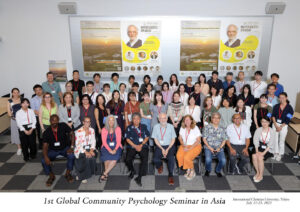
From July 21st to 23rd, 2023, “The 1st Global Community Psychology Seminar in Asia” was held at ICU. This seminar was made possible through a grant from JICUF, with Prof. Toshiaki Sasao at spearheading the initiative. We had the opportunity to speak with Professor Sasao about this seminar and the field of community psychology.
JICUF: Please briefly explain community psychology, which is still relatively unfamiliar in Japan.
Prof. Sasao: Thank you for asking this question. I am happy to put the field into perspective as briefly as possible. As a quick background for community psychology (which I know would not do justice to what the field does), it is a field developed in the turbulent years of the 1960s in the United States when ethnic minorities and socially disenfranchised individuals and communities were showing signs of depravity and poor mental health. Until then and even now, the general perception of the field in Japan is that the psychology field focuses on the intrapsychic factors that affect our well-being and mental health, thereby giving a strictly individualistic view of humans. As such, mental health or illness would be understood mainly as that derived from the inside of the human psyche. In fact, the field of psychology was dominated by this emphasis on the dynamics of intrapsychic factors against the well-being of individuals (e.g., depth psychology, and psychoanalysis); thereby the subfields of psychology such as clinical and counseling psychology have been dominant for over 50 years or more in Japan and Asia.
However, community psychology provided a beacon of hope focusing on the strengths and wellness of many individuals and communities whose resources are often limited. Community psychology is not restricted to direct human services but is directed toward promoting well-being and strengths in many different social settings. In addition, the field addresses many of the issues that threaten human rights and dignity, all of which are in fact relevant to SDGs as adopted by the United Nations. As such, community psychology’s focus overlaps exactly with ICU’s three founding ideals (global, Christian focus, and academics) as much as those emphasized by JICUF; hence, the field of community psychology was well positioned for the missions of ICU even way back in the 1950s. Inclusion of those with diverse social and religious backgrounds and intersectionality is clearly respected while the Universal Declaration of Human Rights is sincerely upheld here on our campus as well.
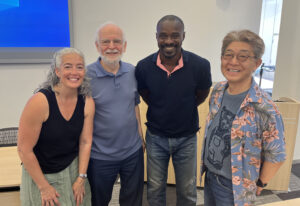
From the right: Prof. Toshiaki Sasao, Dr. Moshood Olanrewaju, Dr. Chris Keys, and Dr. Stephanie M. Reich
JICUF: What relationship and Connection does community psychology have with the lives of actual people?
Prof. Sasao: Yes, community psychology, more than any other field in psychology, is directly connected with the well-being of people in many social settings including homes, schools, workplaces, and neighborhoods in such a way to strengthen and empower people, not necessarily under duress, but in normal living contexts. I can draw some examples from my own research. From my early work in the U.S., the issues addressed with working with ethnic minority communities (e.g., Chinese, Korean, Vietnamese, Filipinos, Thais, Japanese, Hmong, and Russians) were varied to include childcare practices, immigration experiences, family relations, parent-child relations, teachers at schools, substance use, discrimination, social incivility among others, but not only on individual therapies or counseling but also on restoring a sense of community and place in and outside of their own communities.
Global issues such as immigration and refugees and international relations have been addressed as well, including but not limited to psychological distress after the 1992 Los Angeles Riots. More recently, I have been working on the promotion of faculty well-being among college professors in small liberal arts colleges where faculty members have been especially at risk after the pandemic since we all have experienced the changes with student needs, college curricula, structures, and other demands for effective teaching practices such as online pedagogy, use of the English language for classroom instruction, etc. One characteristic feature with community psychology research and practice is the collaborative efforts with other professions, e.g., medical and nursing practitioners, teachers, social workers, community organizers, business owners, and police officers. Especially after some natural or social disasters such as an earthquake, flooding, or neighborhood unrest, community psychologists are often called upon not only to provide individually-based interventions but to assist the community or context to build resilience and restore well-being. The field of community psychology in Asia has been poorly understood and taught in higher education or professional organizations, often simply as the practice of clinical psychology in community settings.
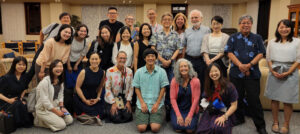
JICUF: What motivated wanting to organize the 1st Global Community Psychology Seminar in Asia?
Prof. Sasao: For over 20 years, the Community Research & Action Group at International Christian University (ICU-CRAG) has taken on a leadership role in promoting the field of community psychology in Japan and Asia. As an independent research collaborative involving ICU campus colleagues and graduate students as well as those at other institutions in Japan, ICU-CRAG has established closer working relationships among those colleagues and professionals in Asia while closely coordinating with those in the U.S. and Europe. Unfortunately, however, there have been only a few such opportunities to create a larger or inclusive network of those in community psychology from the established organizations and institutions of higher education in Asia. Therefore, this idea of a small-scale conference or seminar at ICU came out to reach out and to bring together community psychologists and professionals-in-training from around the world.
More specifically, the purpose was then threefold: (a) to bring together those in Asia, the U.S., Oceania, and Europe for the feasibility of establishing collaboration for three days on ICU campus, thereby charting the solid future of community psychology in Asia, (b) to collaborate on the research and practice exchanges on human rights, peace and justice, given the changing context in the post-COVID19 world, and (c) to provide opportunities for education and training for community psychology in Asia as part of regional activities of American Psychological Association’s Society for Community Research & Action (Div. 27).
Even before this time, the idea of organizing a seminar had its roots way back in 2003-2004 while I was on sabbatical leave from ICU and was teaching community psychology in Chicago. I believe it was right before Thanksgiving Day that I received an email from ICU, informing me that I would have some research money that I had to spend before April. I was still in snowy Chicago, and I was wondering how I should spend this funding for its worth. One of my graduate students from South Korea who was my TA suggested that we should hold a small conference on community psychology in Asia.
Since I was “desperate enough” not to waste the money, I quickly decided to start preparing for a conference. It just so happened that my TA’s former professor at Yonsei University was willing to host community psychologists and students from Japan and Korea on Yonsei campus within three months. I remember I was making several trips to Seoul from Chicago and made all the arrangements for the Japan-Korea Joint Seminar on Community Psychology.
In February 2004, approximately 40 professionals and students gathered in a very comfortable room for all of us from Japan and Korea, sharing research projects and having fun in the city of Seoul for two days. That was the beginning of the next 4 annual seminars that continued between Yonsei and ICU alternately on our mutual campuses on a very meager budget. A colleague of mine from Detroit also joined the seminar when Dr. Paul Toro was a visiting faculty at ICU under the sponsorship of the Japanese Ministry of Education.
ICU’s Emeritus Professor Akira Hoshino (deceased in 2015), whom I succeeded in teaching his cultural and community psychology in 1997, was a keynote speaker at the second Joint Seminar in 2005. Since then, no collaboration occurred till this summer, but with generous funding from JICUF this year, we were able to hold this seminar! This is how the seminar turned out to be at ICU in July this year. Many individuals and groups have provided support for launching this event. I am personally very grateful.
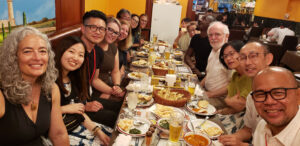
JICUF: What was the most challenging aspect of the process leading to the realization of the seminar?
Prof. Sasao: When I read this question, I am reminded of what Jesus had to go through as he was reaching out to the public in the Gospel of Matthew: “Jesus went through all the towns and villages, teaching in their synagogues, proclaiming the good news of the kingdom and healing every disease and sickness. When he saw the crowds, he had compassion on them, because they were harassed and helpless, like sheep without a shepherd. Then he said to his disciples, “The harvest is plentiful, but the workers are few. Ask the Lord of the harvest, therefore, to send out workers into his harvest field.” (Matthews 9:35-38). When the preparations for the Seminar started a few months before the July event, I keenly realized the amount of work needed to be done was overwhelming. Fortunately, I was able to procure the needed help from my current and former graduate students and undergraduate students at ICU and beyond. I still feel even today that without their timely and relevant assistance, the Seminar could have never been implemented as planned.
Another struggle my assistants and I experienced was making all the travel arrangements for our guests from overseas and money transfers since none of us usually handle these logistical and financial matters. Nevertheless, we were able to manage all the technicalities with timely help from the ICU Center for Research Planning and Support and the Peace Research Institute. Not only did they offer verbal help, but they also offered or delivered assistance on-site!
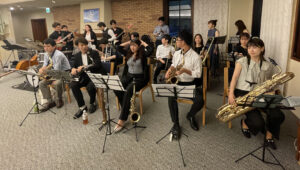
ICU Jazz Orchestra at the dinner reception
JICUF:Could you please share the seminar’s outcomes and your plans for the future?
Prof. Sasao: Not to sound too presumptuous about what we gained from the seminar, but I think the event was a big success in the eyes of mine and others present. I received many kind notes from my colleagues in the U.S., Europe, Asia, and Oceania.
Over the three-day event, close to 20 solid presentations including one keynote speech plus three video-recorded presentations were given to ICU students and faculty, and other participants from off-campus for heated discussion. Out of 60 participants who joined, about 15 were from Kyoto, Nagoya, and Osaka areas. We invited 8 community psychologists from the U.S., Indonesia, Hong Kong, and Korea. A colleague of mine from Poland, a Jesuit priest and psychologist, provided a special Sunday morning ecumenical message on the final day. I am also grateful to the ICU Jazz Orchestra for providing wonderful jazz music during the dinner reception.
As I recollect all these great moments at the seminar, I am currently working to compile a monograph on “Community Psychology in Asia,” based on the presentations and conversations we had during the seminar. Personally, I would like to continue the tradition of the global seminar in community psychology in Asia in the years to come. I am very proud that ICU is the first place to hold this seminar in Asia with my special thanks to JICUF who made this all possible.



